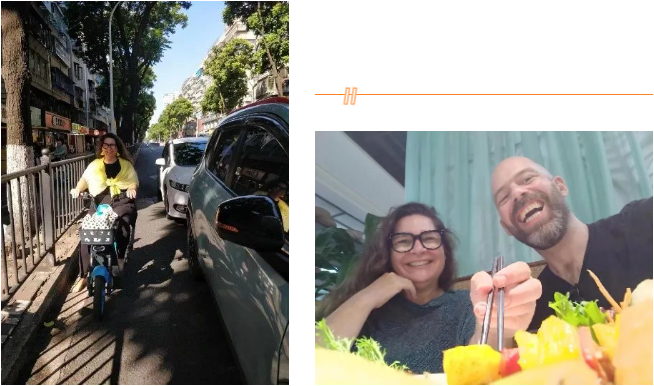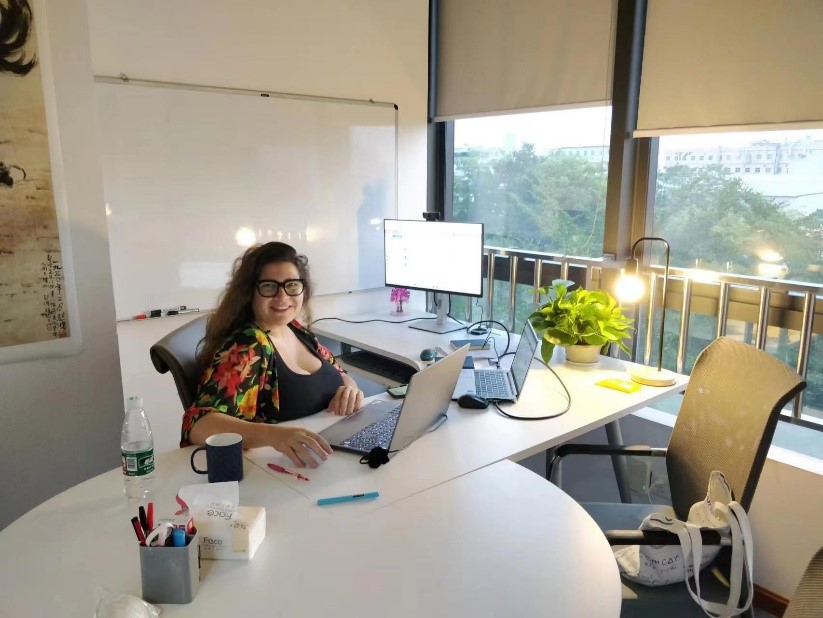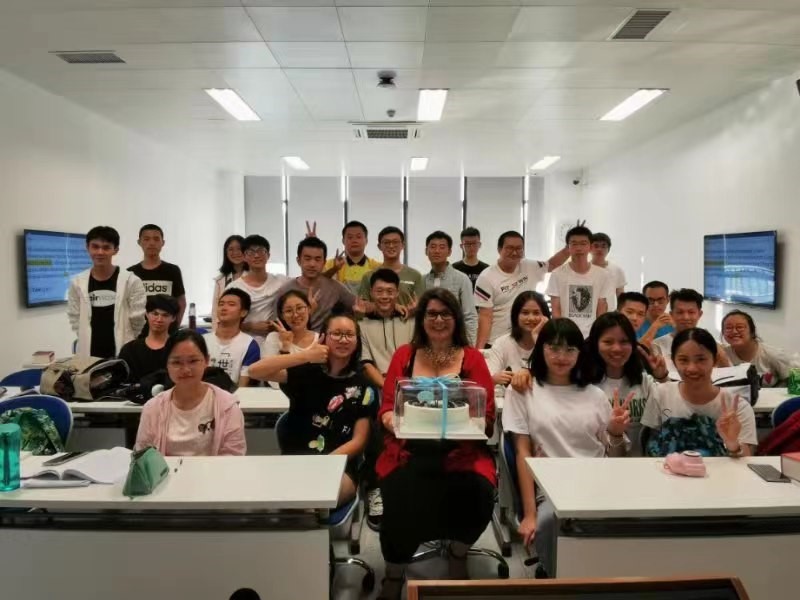PostTime:11/21/2022
Teachers are like the lighthouse, enlightening all the succeeding generations. They devoted themselves to teaching and research, winning many students' respect and love.
The series of interviews with teachers will share their insights on education so that more people can get close to GTIIT's classes and teachers and know about its characteristics and educational philosophy.

Miki Steiner Head of English Program
English-medium instruction is one of GTIIT's characteristics. Many students, when choosing this university, are both excited about a brand-new teaching style and worried about whether they will be able to adapt.
Mrs. Miki Steiner comes from Israel. She is the head of the English program at GTIIT and teaches Technical English for Graduates and Undergraduates at the Technion. Recently, Miki spoke to NPA about her life in China and teaching in GTIIT. In the interview, she also addressed students' worries about how to learn English effectively, how to communicate in English, and how to adjust to full-English instruction.
Here is Miki's story.
In China / Trace the past, cultivate the talents
My first visit to China (2018) was motivated by adventure. I wanted to travel, experience a less familiar culture, and explore new places. I also had a personal interest in coming here. Getting to China brought closure to a family story that began in 1938 when my German great-grandmother, Shlomit, about to be deported to a concentration camp, managed to board one of the trains leaving Berlin and escape to China. She, and many other Jews fleeing Nazi Germany, settled in Shanghai and formed a vibrant community there. As an actress, she soon started performing in radio shows and spent the rest of her life in China with her son and granddaughter Jeanne, who was born in Shanghai.
Although not much is known about the German Jewish community in China, I felt that just by visiting China, I was closer to my family's history and origin. I am thankful that China, being one of the very few countries not restricting immigration during World War II, provided home and shelter for my family when they needed it most.
In Israel, I have little spare time. Juggling family life, work, and research is time-consuming and exhausting. In China, I spend my spare time exploring Shantou with my partner, Hagai. We rent bikes or go on long walks. Shantou has a delicate balance of rural and urban areas, we get to know places nearby and appreciate their unique charm and appeal. Another aspect of Chinese life we find enchanting is the early lunch followed by a sweet nap. I hope to keep this habit when I go back home.

After two summers at GTIIT, I am completely smitten with this place. I love living on campus and not having to commute every day; I love the mountain view from my window, and above all, I love my students. On my first day of teaching, back in 2018, I decided to get to my 8 am class a bit earlier to make sure I knew how to handle the media system and upload materials I needed for the lesson. When I entered the classroom, I was shocked to realize all my students were already there, quietly waiting for the lesson to start – books and pens on the tables. This never happens in Israel! So when an entire class arrives early to be better prepared for the lesson, it motivates me to work harder and care more. This little anecdote explains why the word 'diligence' comes to mind in reference to GTIIT.
Learn English / overcome language barrier, aid sci-tech education
English adds another layer of complexity to an already complicated topic. STEM is not easy, to begin with. Math, for instance, is already a language in and of itself. Studies have shown that Math thinking and problem-solving are influenced by one's mother tongue. Chinese students, research claims, have a more visual and spatial understanding of Math than English speakers, which means language can motivate a different approach to Math (visual vs. verbal), and shifting from Chinese to English is more than a language shift. It's a change of thinking mode.

Miki Steiner in her office
Teaching English is tricky because second language acquisition usually occurs at a later stage when the knowledge, information, thoughts, and feelings a person develops in life can be easily expressed and conveyed in the primary language. The medium of language becomes transparent in one's mother tongue, and the introduction of another language eliminates this transparency. Instead of focusing on the subject matter of Physics / Mathematics / Biology / Chemistry and so on, GTIIT students must first overcome the language barrier. Their scientific knowledge surpasses their English language skills, and our job as English teachers is to help them close this very frustrating gap, which undermines progress. We must figure out innovative ways to develop students' mastery of English without compromising or oversimplifying content.
Teaching Philosophy / consolidation and flexibility
While the courses differ in many respects, the main objective of teaching English is similar: to enhance students' English language skills and motivate them to think, present, and converse in English. In all courses, the emphasis is on reading comprehension, implementation of academic technical terminology, writing, and eloquence in English.
Flexibility is key to teaching. No matter how well I prepare for a lesson, there are always surprises. Something that works so well in one group turns out to be mediocre in another. Sometimes a discussion organically forms in class, and other times students stare at me, trying to remember who I am and why I am bothering them with so many questions… Being flexible and open to trying new approaches makes our job more complicated as we cannot use the same old methods and expect the same results. However, it also enables finding new and interesting strategies for meaningful learning with our students.
I teach an elective course about Liu Cixin's sci-fi trilogy, The Three-Body Problem. The idea for the elective course came from my prep students in the summer of 2019. They saw me reading Liu Cixin's Dark Forest and were so excited to learn that Chinese sci-fi had become popular in Israel that we ended up using the novel as a trigger for class discussions. Usually, it's quite challenging to prompt first-year students to speak in class and engage in conversations, but Liu Cixin's novel served as an incredible ice-breaker. Everyone had something to say about it, and the course basically wrote itself.

Miki and 2019 prep students
Consilidation also matters. As English teachers, we can ease the shift by providing students with the necessary vocabulary and technical terminology for STEM studies. Together with STEM teachers, we have compiled an initial glossary to help students transition from Chinese to English. This interview is an excellent opportunity to thank the departments that sent glossaries and feedback and urge those that have not to support this initiative at their earliest convenience.
Chinese students are very respectful, diligent, and hard-working. They have tremendous potential and exhibit beautiful ideas but are often too shy to share their thoughts or ask questions in class. This lack of feedback creates gaps that become insurmountable as the semester progresses.
There is also one essential tip for second language acquisition. It's so simple that I often wonder why students (everywhere, not just in GTIIT) are so reluctant to embrace it. The tip is not about what you should do but what you must stop doing. You must stop saving face. Your mistakes in English are part of your learning process. Accept them, enjoy them, and learn from them. No one laughs at your mistakes or your pronunciation but you. You are your worst judge, so cut yourself some slack and make room for learning by allowing yourself to err. I want to be very clear: You cannot learn a language without speaking. You cannot speak without making mistakes. Basic logic entails that you must make mistakes in order to learn. To be too self-conscious and unwilling to err is the same as saying you do not want to learn English. At GTIIT, there's no learning without it.
Message to GTers:
Enjoy this period in your life. Challenge yourself and set daily feasible goals that will encourage you to step outside your comfort zone.
Text/Photos: Miki Steiner, GTIIT News & Public Affairs
© GUANGDONG TECHNION-ISRAEL INSTITUTE OF TECHNOLOGY | 粤ICP备17036470号
